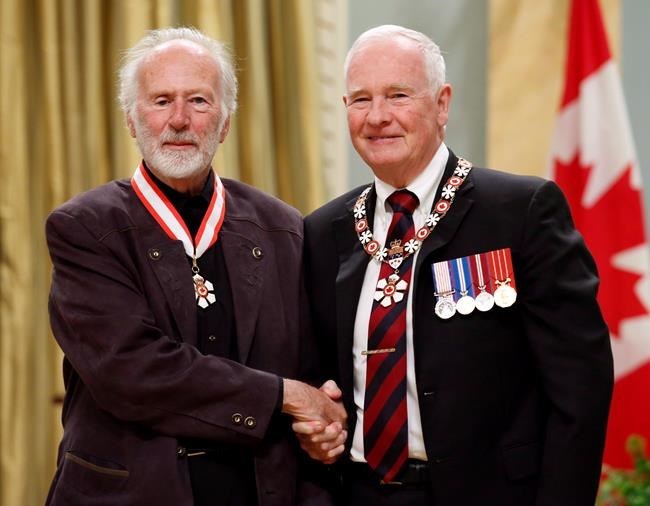
Governor General David Johnston invests R. Murray Schafer as a Companion of the Order of Canada during a ceremony at Rideau Hall in Ottawa on September 12, 2014. Canadian composer R. Murray Schafer, whose ground-breaking research in acoustic ecology helped move the needle on the understanding of soundscapes, has died at 88. THE CANADIAN PRESS/Patrick Doyle
Republished August 16, 2021 - 2:20 PM
Original Publication Date August 16, 2021 - 9:46 AM
TORONTO - Acclaimed composer R. Murray Schafer, whose groundbreaking research in acoustic ecology helped move the needle on the understanding of soundscapes, has died at 88.
Eleanor James, Schafer's wife, told friends by email the prolific creator died on Saturday morning near Peterborough, Ont., after a battle with Alzheimer's disease.
Lauded in many circles of the arts and academia, the Glenn Gould Prize winner's approach to music combined less conventional forms of theory and environmental studies into sprawling and complex works that challenged his audience.
Some of his pieces were performed in vast outdoor spaces, asking the audience to go the extra distance — sometimes literally boarding a bus into the forest — to experience an unparalleled performance within a natural world.
"What Murray would love to say was that the wilderness and the environment offer a constant and infinite set of variations when you listen," said longtime friend and former CBC Music producer David Jaeger.
"He felt very close to the land and he felt that we needed to become one with the land to value what's there."
Schafer was born in 1933 in Sarnia, Ont., but his family moved to Toronto during his youth.
He enrolled in the University of Toronto's Royal Conservatory of Music at 19, studying under musician and professor John Weinzweig, who was often called "the dean of Canadian classical music" for his mentorship of some of the country's greatest composers.
Schafer's time on campus would be a driving force for the direction of his career. He befriended Marshall McLuhan, who is considered to have left a lasting impression on his perspective of the world.
After leaving Canada for Vienna in 1956, studying under composer Peter Racine Fricker while away, Schafer returned in 1961 to direct the "Ten Centuries" concerts, and later teach at Simon Fraser University in Burnaby, B.C., for a decade starting in 1965.
It was at the university where he secured grants to establish the World Soundscape Project, a study of acoustic ecology or the connection between humans and sound in their environments.
His fascination with the topic defined years of his work as he explored the effects of noise on people, particularly in urban settings, earning himself the title of "father of acoustic ecology." Much of his research and philosophies on soundscape were compiled in his 1977 book "The Tuning of the World."
Schafer often rebelled against urban life, Jaeger said, coining the term "schizophonia" to describe the separation of a sound from its original source through electronic reproduction.
Espirit Orchestra founder Alex Pauk described Schafer's ideal performing space as one without walls, which is why open-air performances appealed to him so greatly. But even inside the concert hall, he would strive to break down traditional barriers, at times situating the musicians within the audience.
In the 1980s, Schafer returned to the Patria cycle, a series of pieces he'd spent around 40 years of his career exploring in various forms. Doubled in size to 12 works, each one negotiated the relationship between the location of a performance and the art form itself.
"Patria Prologue: The Princess of the Stars" required the audience to board a school bus and travel down logging roads deep into the forest for a performance that began before dawn in canoes on the water.
The story tells of a princess who, captured by a three-horned enemy, is compelled to sing an aria before a ritual timed to the sunrise.
"Musicians were placed all around Wildcat Lake and that particular piece began at four in the morning and when the sun broke through clouds," recalled Pauk of one performance.
"He loved the idea of having the environment and the animals in the environment respond to orchestral sounds"
While working with CBC in the late 1990s, Jaeger captured a performance of "The Princess of the Stars" for the broadcaster.
"Our microphones were literally kilometres apart to cover this recording," he remembered.
"We were able to take advantage of all the reflected sounds that came off the hills, around the water and the hardwood forests ... In the resulting program, you hear the wildlife; you hear a fish jumping; chipmunks; you hear loons and grackles — all manner of wildlife chiming in, along with the musicians."
Schafer continued his exploration of soundscapes late into his career, winning a 2010 Dora Mavor Moore Award for outstanding new music or opera for "The Children’s Crusade," performed in a vacant Toronto warehouse.
His 2012 memoir "My Life on Earth and Elsewhere" was published shortly after Schafer told his friends about his Alzheimer's diagnosis.
"He knew that he was losing his grasp of detail and he thought he really better get this book written now while he still had the chance," Jaeger said.
In 2015, Schafer wrote his final string quartet, "Alzheimer's Masterpiece."
Even with signs of his deteriorating mental condition, his wife — herself a mezzo-soprano — told friends her husband's love for composing never faded.
Jaeger recalled her saying: "He was still bubbling over with music."
This report by The Canadian Press was first published Aug. 16, 2021.
Note to readers: This is a corrected story. A previous version misspelled "Jaeger."
News from © The Canadian Press, 2021